If you’re searching for fresh and original content ideas to boost your online presence, Google Search Console (GSC) is just what you need.
In the digital world, keeping your content engaging and relevant is essential. GSC acts as your content compass, guiding you toward untapped sources of inspiration.
In this article, we’ll explore how to generate various topic ideas, make the most of GSC’s capabilities, uncover valuable SEO content insights, and offer practical tips for utilizing this powerful tool.
Table of Contents
The Benefits of Using Google Search Console To Get Content Ideas
Google Search Console (GSC) is an excellent resource for content producers and website owners looking to improve their online visibility.
This free SEO tool provides several advantages, making it an excellent resource for producing article ideas.
Let’s take a look at why utilizing Google Search Console might alter your content strategy.
No Cost
One of the primary advantages of using Google Search Console is that it is entirely free. Because of its ease of use, companies of all sizes can benefit from it.
Whether you’re a startup or an established company, GSC offers valuable insights at no cost.
Real Search Data
GSC provides genuine search data straight from the source: Google itself.
This means you receive information directly from users’ interactions with the search engine giant.
It’s like having a direct line to the most significant search engine in the world, allowing you to pattern your content to precisely what your audience is looking for.
Understanding User Behavior
With GSC, you can get better insights into how people discover your content through Google searches.
It shows you which keywords led users to your site, enabling you to grasp what topics resonate with your audience.
Click vs. Impression
GSC distinguishes between clicks and impressions, offering a good view of user engagement.
A click represents when a user taps on a link to your site in the search results. On the other hand, an impression signifies that your page appeared in search results, but the user didn’t click through.
This differentiation is crucial in fine-tuning your content strategy.
For instance, having a high impression count but low clicks for certain keywords indicates an opportunity to improve your meta description or page title to entice more clicks.

Unique Data
GSC unveils data that’s often unavailable through other keyword research tools.
It showcases specific queries users entered to find your site, giving more details on user intent.
This insight is invaluable for making your content meet user expectations effectively.
Long-Tail Keywords
Long-tail keywords, which are longer and more specific search phrases, often convert better and have less competition.
GSC helps you identify these long-tail keyword opportunities, allowing you to create content that precisely targets niche audiences.
Tip 1: Monitoring Search Queries and Pages with Google Search Console
Google Search Console (GSC) is very useful when finding content ideas that resonate with your audience.
In this tip, we’ll walk you through accessing and leveraging the data within GSC to monitor search queries and pages effectively.
How to Access GSC’s Search Queries and Pages
To begin, log in to your Google Search Console account and select the website property you want to analyze. Once inside, navigate to the “Performance” or “Search Result” tab.

Main View – Queries, Page, and Filter
You’ll encounter three main views in the Performance tab: Queries, Pages, and Filters.
- Queries: This view displays the search queries that users have entered into Google, which have led them to click on your website. By default, you see the top queries that are causing clicks.
- Pages: The Pages view shows you the specific pages on your website that receive the most clicks. It provides insights into which pages are performing well in search results.
- Filter: The Filter option allows you to refine your data analysis. You can select a group of pages or queries that include the same term, or if you’re feeling more advanced, you can use regular expressions (regex) to filter data based on specific criteria.
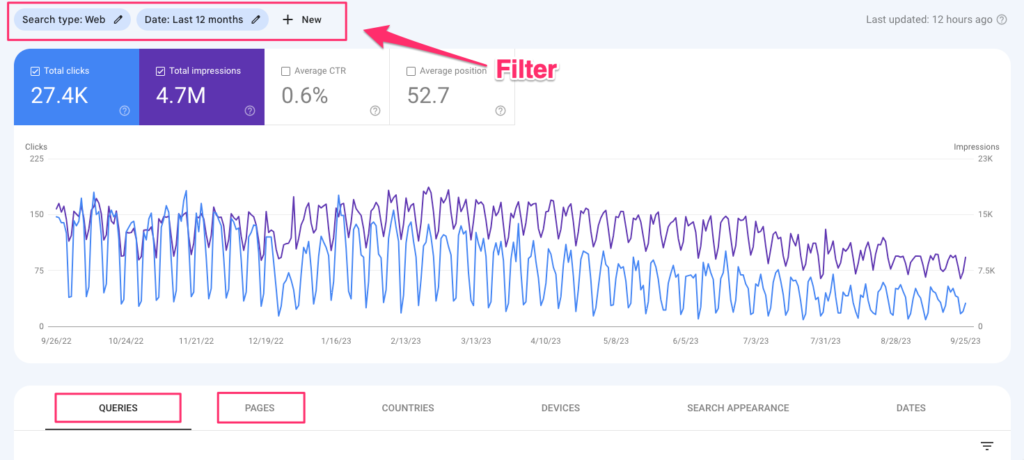
Leveraging the Data
Now that you know how to access these views, let’s look at how to leverage this data for generating content ideas:
1. Check the Queries:
- Begin by inspecting the Queries view. By default, you’ll discover the top inquiries generating traffic to your website.
- Look for questions that haven’t been answered on your website yet. These are chances to develop fresh content relevant to what your audience is actively looking for.
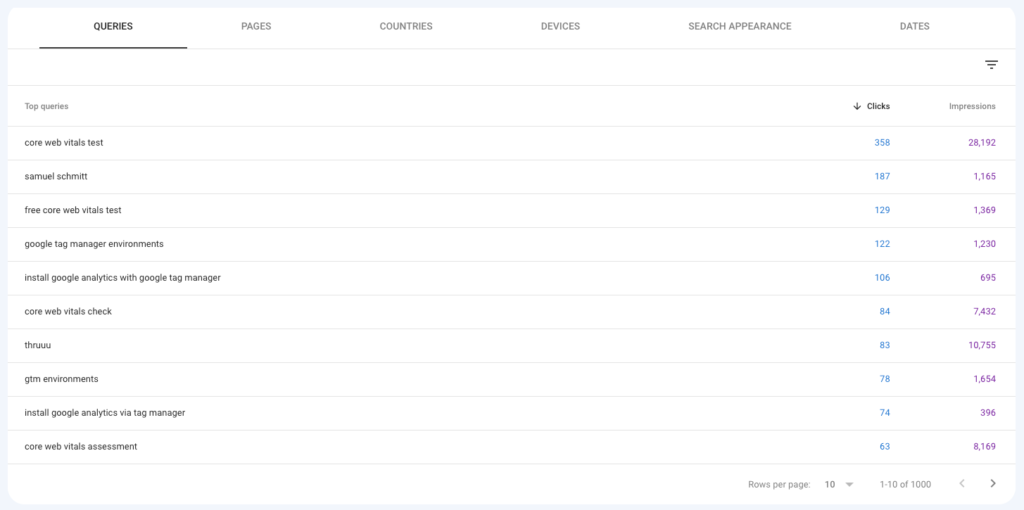
2. Explore the Pages Tab:
- Switch over to the Pages tab, which displays the pages on your website driving the most clicks.
- Click on one of the top-performing pages, and then navigate to the Queries view.
- Now, you’ll see only queries related to the selected page. This is a powerful way to identify supporting topics and keywords for your existing content.
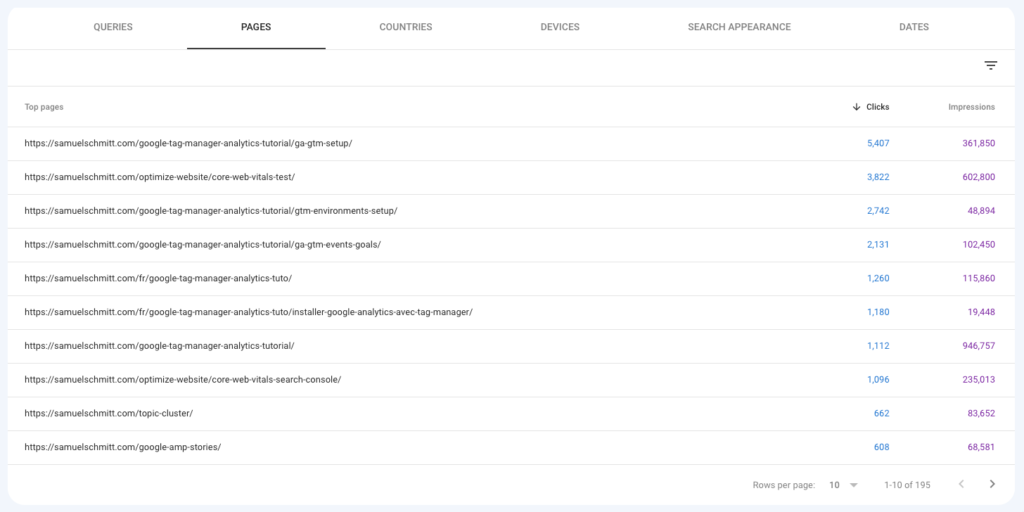
3. Advanced Filtering:
- Take your analysis to the next level by using the Filter option.
- Click on “Filter” and select groups of pages or queries containing specific terms. For instance, you can filter for queries related to a particular topic or pages with a specific URL fragment.
Using Regex in GSC to Highlight Topics
Regular expressions can be used in GSC if you are familiar with them. For example, you might write \b(?:topic1|topic2)\b as a regex pattern. This will help you identify queries or pages that match “topic1” or “topic2.”
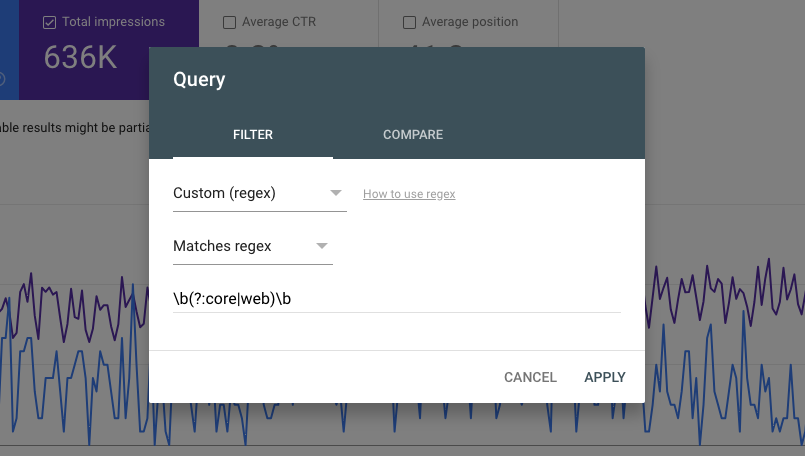
💡Pro Tip: When exploring queries, consider sorting them by impression. Impressions can be seen as a measure of search volume. Sorting by impression lets you identify popular queries and understand what topics are trending among your audience.
Limitation
It’s important to note that while GSC provides valuable data, it does require some manual work to compile a long list of content ideas.
However, the insights gained are worth the effort.
Monitoring search queries and pages in Google Search Console is a strategic approach to getting content ideas.
By analyzing user search behavior, you can identify content opportunities, support your existing pages, and use advanced filtering techniques to find even more ideas.
Tip 2: Finding Longtail Keywords and Questions with Google Search Console
In the world of SEO and content creation, longtail keywords and questions help with specific user intent and can drive valuable organic traffic.
Using GSC’s regex features, you can precisely identify and target longtail keywords and questions your audience is actively searching for.
GSC Regex for Longtail
Regex for longtail keywords is fantastic because it lets you focus on super-specific search queries. With different patterns, you can spot longer queries (those with 7+ words) in Google Search Console.
Use the following regex pattern to get longtail keywords ([^” “]*\s){7,}?
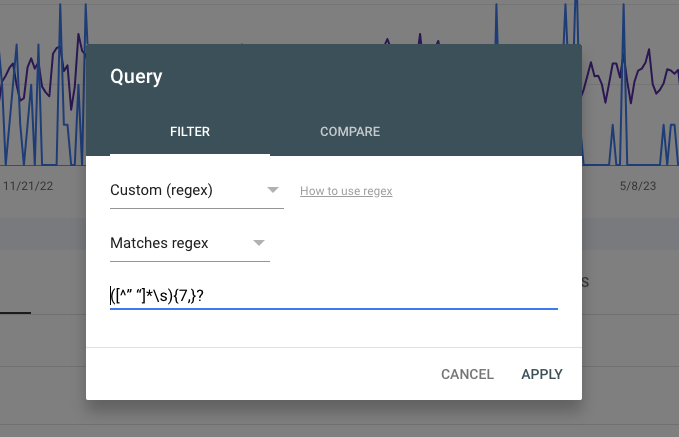
It will return queries with more than 7 words. Change the number as needed for shorter or longer phrases. Sorting results by impressions reveals impactful longtail queries.
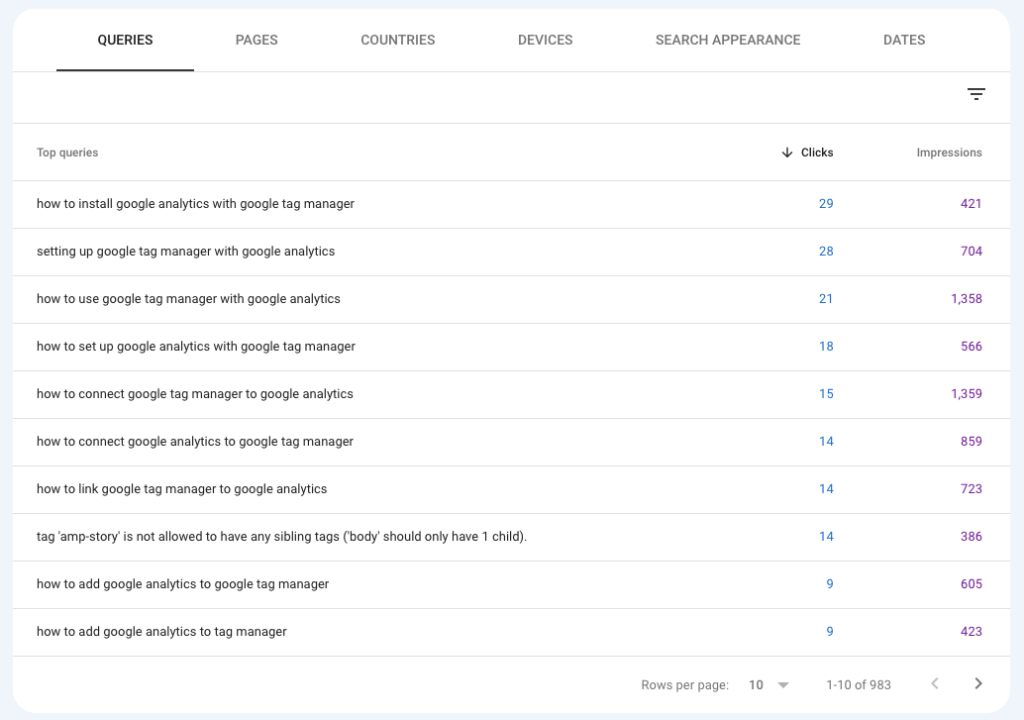
These detailed queries show exactly what users want to know, giving you a chance to create content that answers these unique topics perfectly.
GSC Regex for Questions
Regex for questions allows you to find specific queries with ease. For instance, with a pattern like ^(who|what|where|when|why|how)[” “], you can identify questions starting with common question words in Google Search Console.
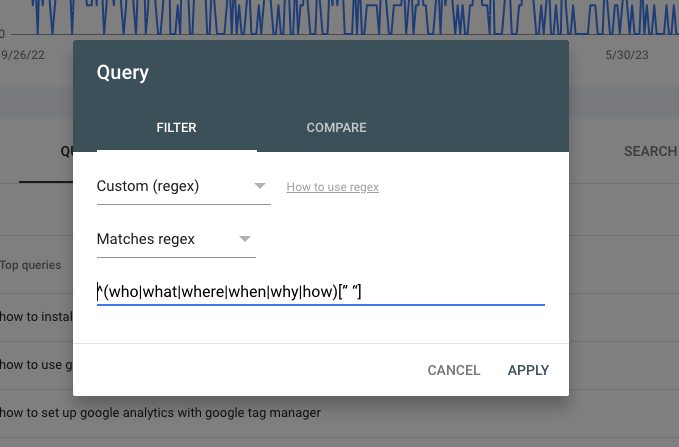
You can then use these questions as H2 headings and optimize your content for featured snippets.
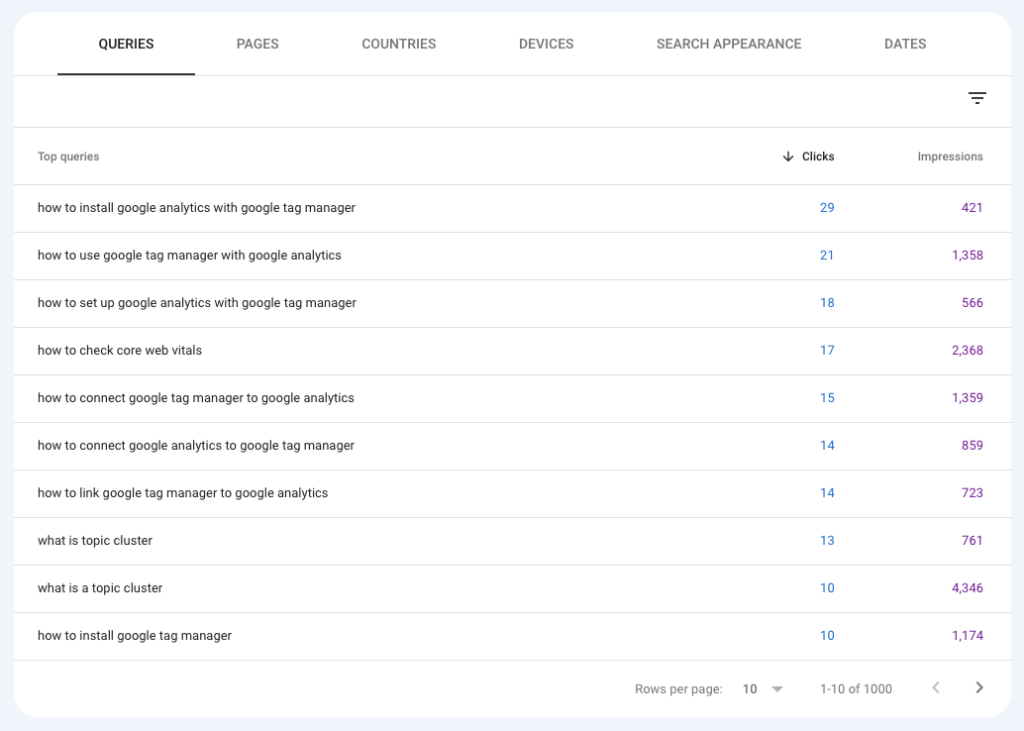
This is great because it helps you understand what users are searching for, enabling you to create content that directly addresses their queries. It enhances your content’s relevance, attracts more organic traffic, and positions you as a valuable source of answers in your niche.
Here’s how to use these regex in GSC:
1. Access GSC: Log in to your Google Search Console account and choose the relevant website property.
2. Navigate to the “Performance” or “Search Result” Tab: This is where you’ll find the data you need.
3. Use Regex Filters: By employing regex filters, you can create custom patterns to identify longtail keywords or questions.
4. Analyze the Results: Once you apply the filter, GSC will display a list of queries that match your criteria. These are valuable longtail keywords and questions that you can target in your content.
Tip 3: Unlocking Insights with Google Search Console’s “Insights” Feature
The “Insights” area of Google Search Console is a valuable tool that gives a wealth of information to assist you in refining your content strategy and improving your website’s performance.
This tip will go through how to utilize this tool, use the data it provides, and its limitations.
How to Access the “Insights” Feature
Here’s how to do it:
- Log in to GSC: Start by logging in to your Google Search Console account.
- Select Your Property: Choose the website property you want to analyze if you have multiple properties.
- Navigate to “Insights:” On the left-hand menu, click on “Overview” and then you will see the Search Console Insights link. This will take you to a dashboard filled with valuable data.
- Alternatively, you can as well follow this link https://search.google.com/search-console/insights/
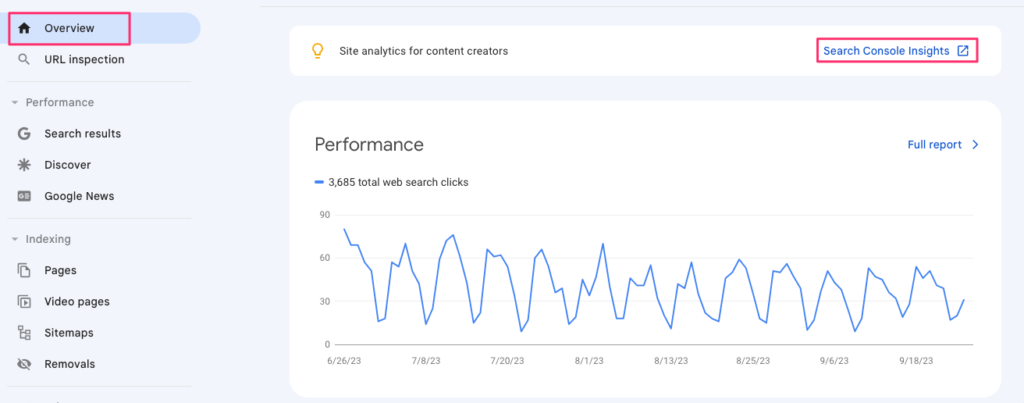
Leveraging the Data
The “Insights” feature is divided into several sections, each providing unique insights that can drive your content strategy:
- Your Growing Content: This section highlights your trending content. Use this data to identify related topics and create supporting articles. If you see a particular topic gaining traction, consider producing more content around it to capitalize on its popularity.
- Your Most Popular Content: Discover which pages are performing the best. Analyze the content on these pages to understand why they are popular and use this knowledge to create more high-performing content.
- How People Find You Via Keyword: Gain insights into the keywords that drive traffic to your website. This data can help you identify which keywords are most effective in attracting visitors. Use this information to optimize existing content or create new content targeting these keywords.
- Most Searched: This section displays the most frequently searched queries related to your website. Use these queries to find content ideas that align with users’ searches.
- Most Trending: Discover trending queries and topics. This data can help you stay ahead of the curve and create content relevant to current trends and interests.
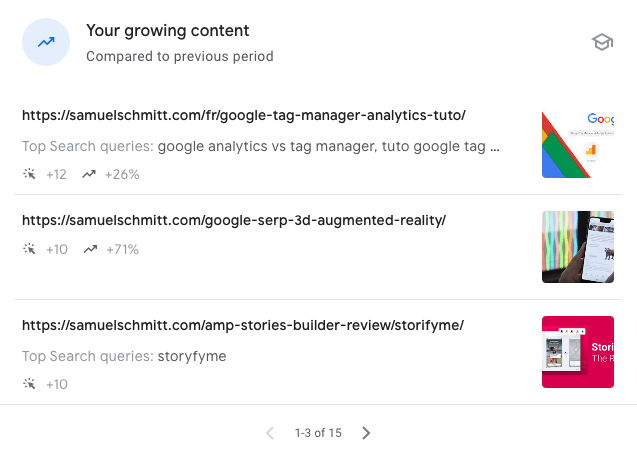
Limitations
While Google Search Console’s “Insights” tool provides useful information, it’s crucial to understand its limitations:
- Manual Work: As with other GSC capabilities, employing “Insights” necessitates some manual analysis. You must understand the data and decide how to incorporate it into your content plan.
- Limited Data Set: GSC’s “Insights” tool gives a glimpse of your website’s performance, although it may not include all the data you need for a thorough review. You may wish to supplement this data with information from other tools and sources.
The “Insights” function of Google Search Console is a great asset for content writers and website owners. You may monitor trends, locate popular content, and learn how people find your website by using this tool and browsing its many areas.
While it involves some manual labor and has restrictions, the insights gathered by “Insights” can be critical in developing an effective content plan and enhancing the overall performance of your website.
Tip 4: Transform One Article into 1,000 Articles with Keyword Clustering
Content development is among the most important prerequisites for online success in today’s vast digital marketplace.
However, with so much material available, how could you generate as many ideas for content as you require?
The solution is keyword clustering, a powerful approach that may turn a single article idea into hundreds of content ideas.
Let’s look at how you may accomplish this with the keyword clustering tool thruuu.
What Is Keyword Clustering?
Keyword clustering is the practice of grouping keywords together based on their similarity in search engine results pages (SERPs).
By organizing related keywords into clusters, you gain a clear understanding of the topics and subtopics that are relevant to your content.
This approach helps you create a comprehensive content strategy.
How to Access thruuu
To use thruuu, go to the thruuu website and sign up for a free account. After registering, you may begin using the tool.
thruuu provides an easy-to-use interface and a variety of functions that may help with keyword grouping, content brainstorming, and much more.
Furthermore, you can sample your first keyword clustering session with up to 500 keywords for free, making it a useful and accessible resource for content authors.
Cluster 500 Keywords for Free
Organize your content for improved SEO and user experience with our Keyword Clustering and Topic Clusters feature
How to Use thruuu
Now, let’s explore how to use thruuu to generate a multitude of content ideas:
- Gather Your Initial Set of Keywords: Begin by collecting a set of keywords from Google Search Console (GSC). It’s advisable to focus on one primary article topic, but you can also employ the regex filtering method discussed in Tip 1 to extract keywords related to multiple articles or queries.
- Upload Your List of Keywords to thruuu: Once you have your keyword list, upload it to thruuu’s platform.
- Select the SERP: Choose the search engine results page (SERP) you want to analyze. thruuu lets you analyze any Google search in 151 languages and for 196 countries
- Enter a Domain: Input your website’s domain into thruuu. This is crucial as it allows thruuu to determine where you already rank in the top 10 results for specific keyword clusters.
- Start the Process: Initiate the keyword clustering process. This will allow thruuu to work its magic and generate clusters of related keywords.
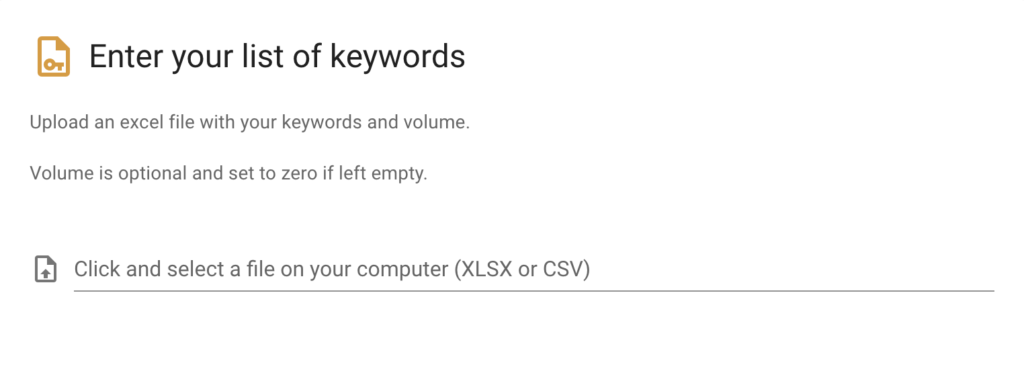
Now, let’s explore the results:
- Pick Your Favorite Cluster: Among the keyword clusters generated, select the one that aligns most closely with your content goals and interests.
- Create a List of Ideas: Start compiling a list of content ideas within your chosen cluster. These could be variations of your original article topic or spin-off topics inspired by the cluster.
- Explore Content within the Cluster: Get deeper into the content of the cluster to uncover even more ideas. Pay attention to subtopics that can be explored in separate articles.
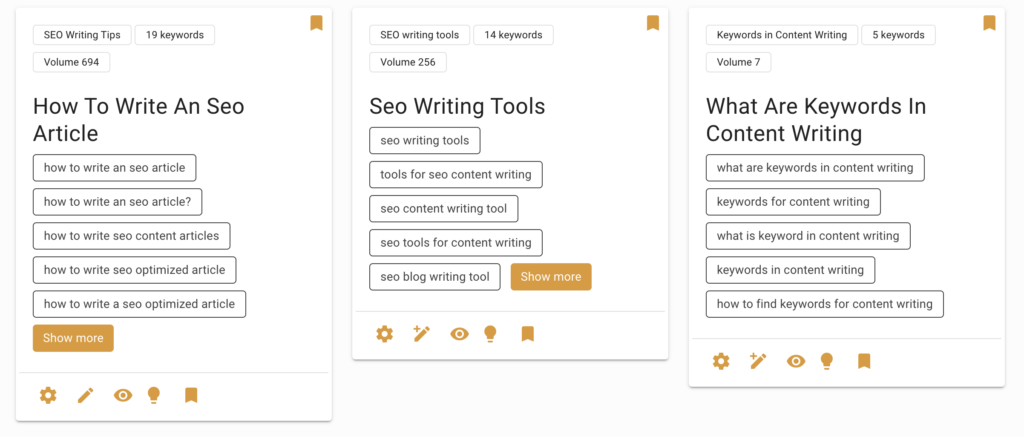
You can use thruuu to start with a single article and expand it to a large number of ideas to create supported articles and follow a topic cluster strategy.
We have a case study that explains this exact same technique. You can learn more about breaking down an article into keyword clusters here.
Advantages of Clustering GSC Keywords with thruuu
Clustering keywords from Google Search Console with thruuu offers several advantages:
Efficiency
Instead of manually grouping keywords and brainstorming content ideas, you can swiftly generate a lot of ideas with minimal effort. You can use thruuu to group up to 15,000 keywords based on SERP similarity.
Comprehensive Strategy
Keyword clustering helps you develop a comprehensive content strategy by identifying related topics and subtopics that resonate with your target audience.
Improved SEO
By creating a network of connected content, you enhance your website’s SEO performance and increase its authority on specific topics.
Analyzing Keyword Clusters Content
thruuu offers a unique feature. For every single keyword cluster generated, it will analyze the top-ranking websites, extract on-page information, and gather various reports.
This will help you understand how to craft the best content to rank for this set of keywords.
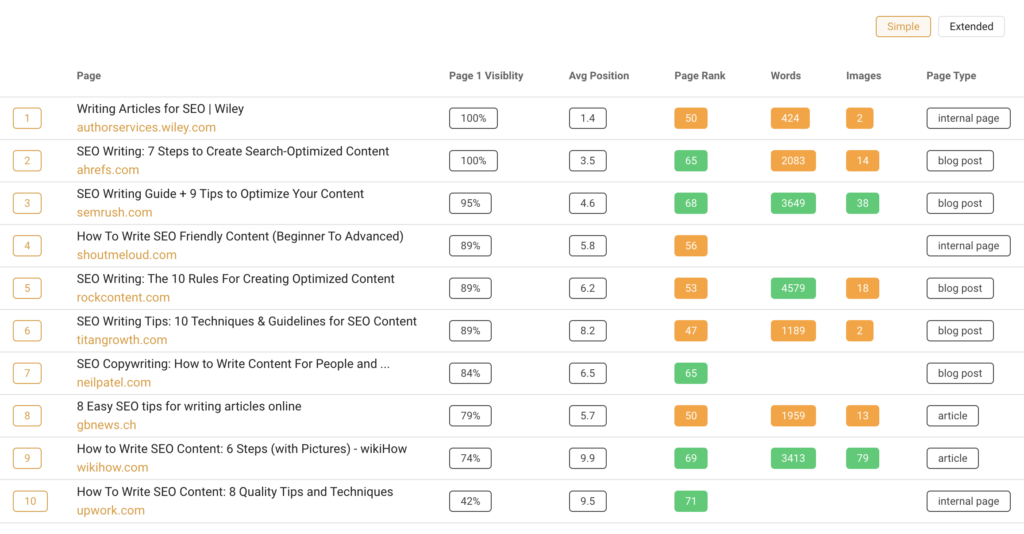
Content Briefs
thruuu goes a step further by allowing you to start the content creation process. You can generate content briefs based on the clustered keywords, providing a structured framework for your writing.
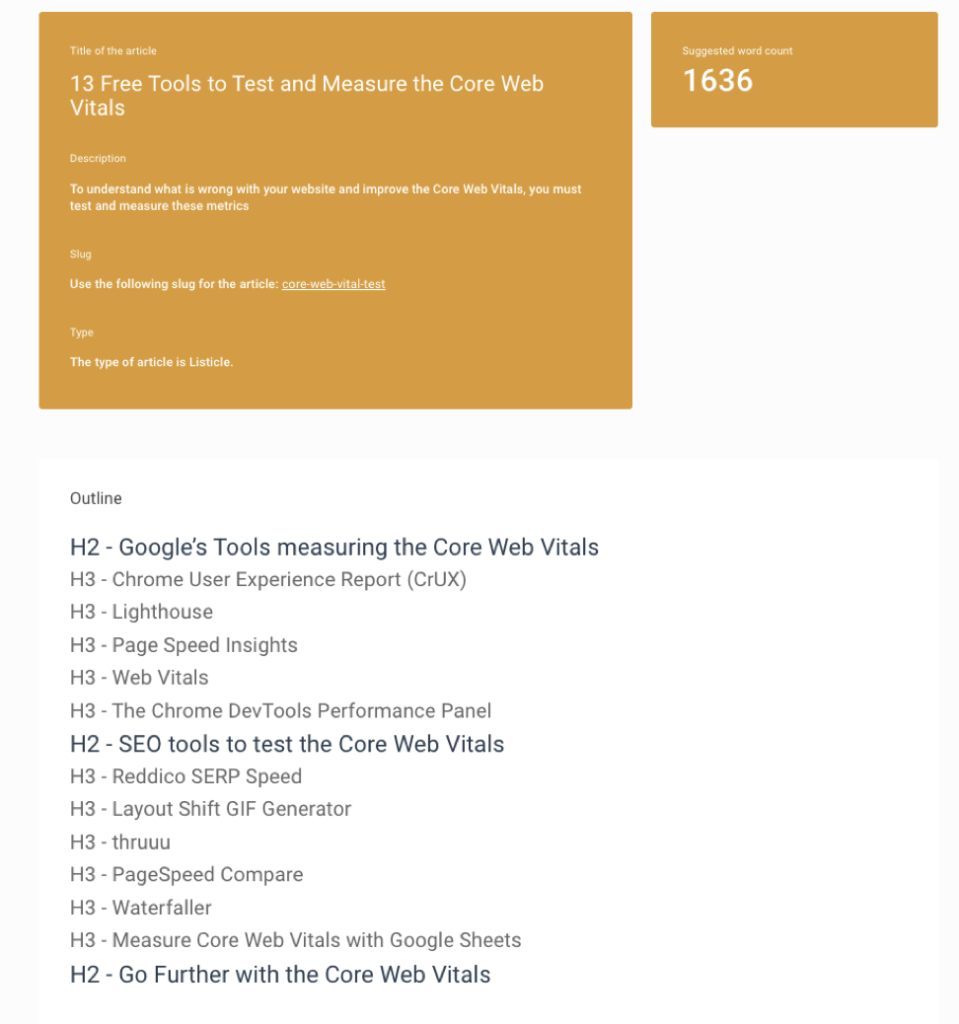
Tip 5 (Bonus): Get Thousands of PAA
While keyword clustering with thruuu is a powerful technique, this tool offers an additional bonus tip that can take your content ideation to the next level: accessing the “Question” tab within the thruuu Excel report.
(Ok, we go away from Google Search Console, but it is worth it!)
Here’s how you can uncover thousands of People Also Ask (PAA) questions and related inquiries associated with your keyword cluster:
Download the Excel Report
After performing keyword clustering using thruuu, download the Excel report that’s generated. This report contains a wealth of data related to your keyword cluster.

Visit the “Question” Tab
Within the Excel report, you’ll find a tab labeled “Question.” Click on this tab to access PAA questions and other queries associated with each keyword in your cluster.
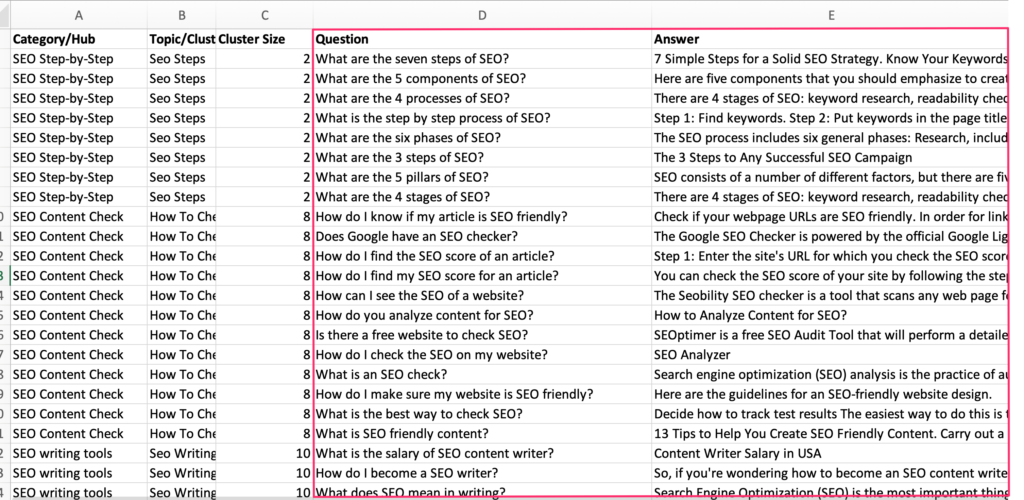
As you can see, you started from a list of keywords exported from Google Search Console, and now you uncovered a multitude of PAA questions that users commonly ask on search engines.
These questions provide valuable insights into the interests and concerns of your target audience. You can use this information to:
- Create dedicated articles or blog posts that answer specific PAA questions.
- Develop comprehensive FAQs on your website.
- Craft content that directly addresses the pain points and queries of your audience.
- Optimize existing content to include relevant PAA questions and answers.
Conclusion
Google Search Console (GSC) is a great asset for content creators and website owners.
It is an important tool, empowering you to craft a robust content plan, get fresh content ideas, and ensure the ongoing relevance of your existing articles.
GSC’s data and insights equip you with the knowledge needed to stay ahead in the competitive world of online content.
By harnessing its capabilities, you can drive organic traffic, enhance your SEO strategy, and effectively cater to your audience’s evolving needs.
Empower Your Content Team
With thruuu, you will save a lot of time analyzing the SERP and get better SEO results by crafting the perfect content.
Don’t miss this opportunity.
